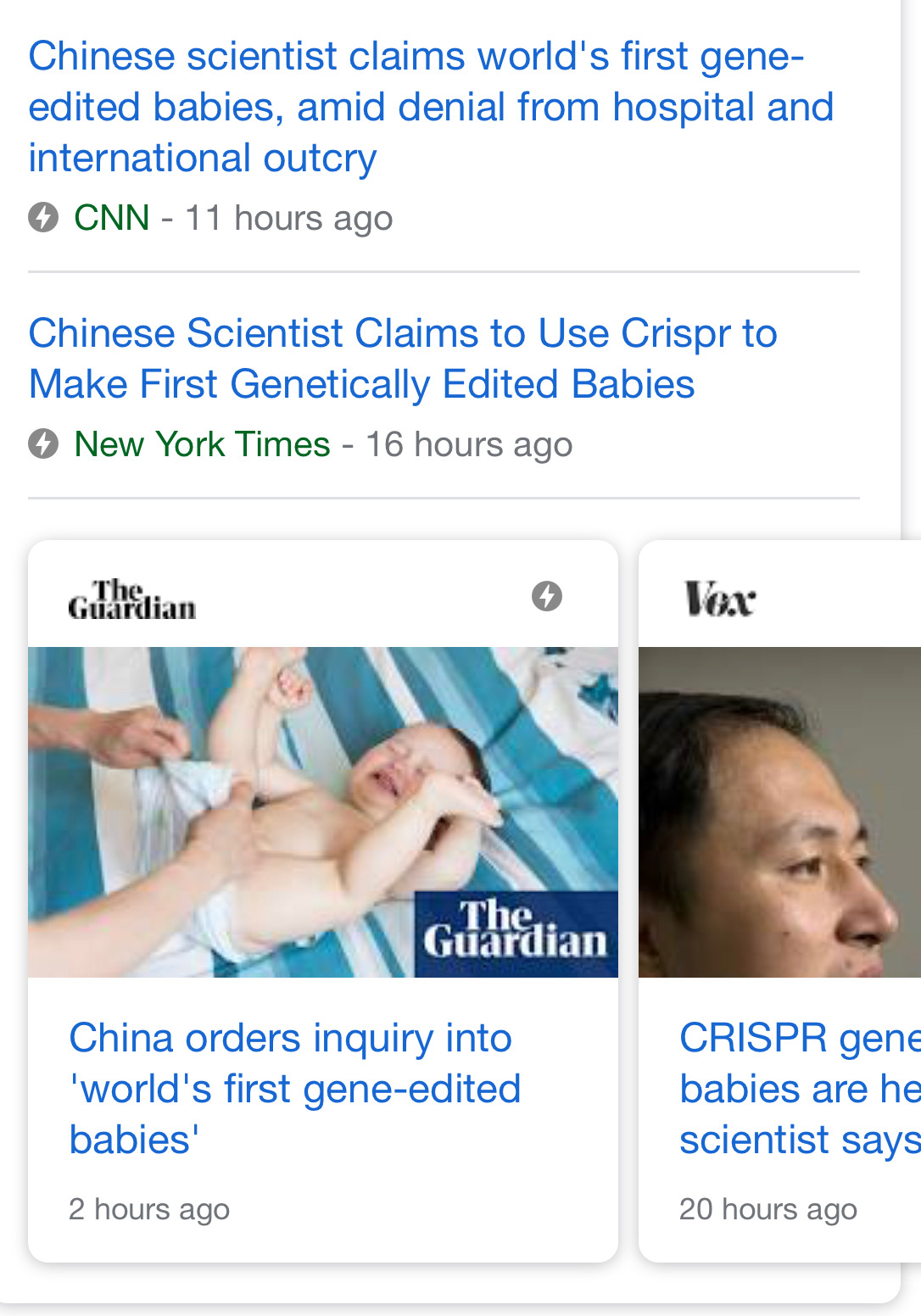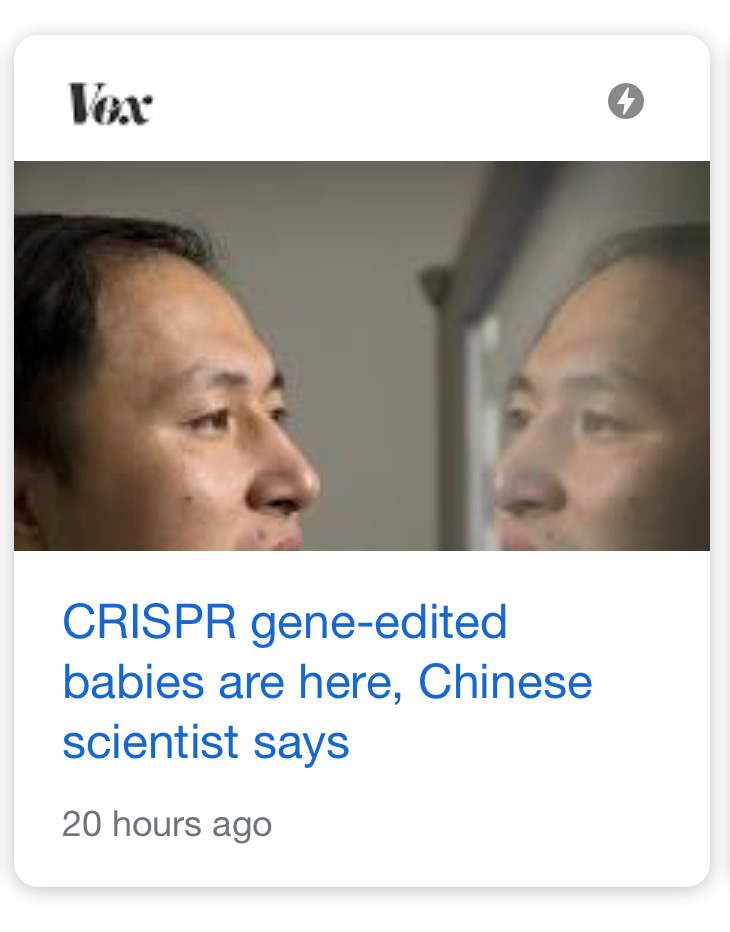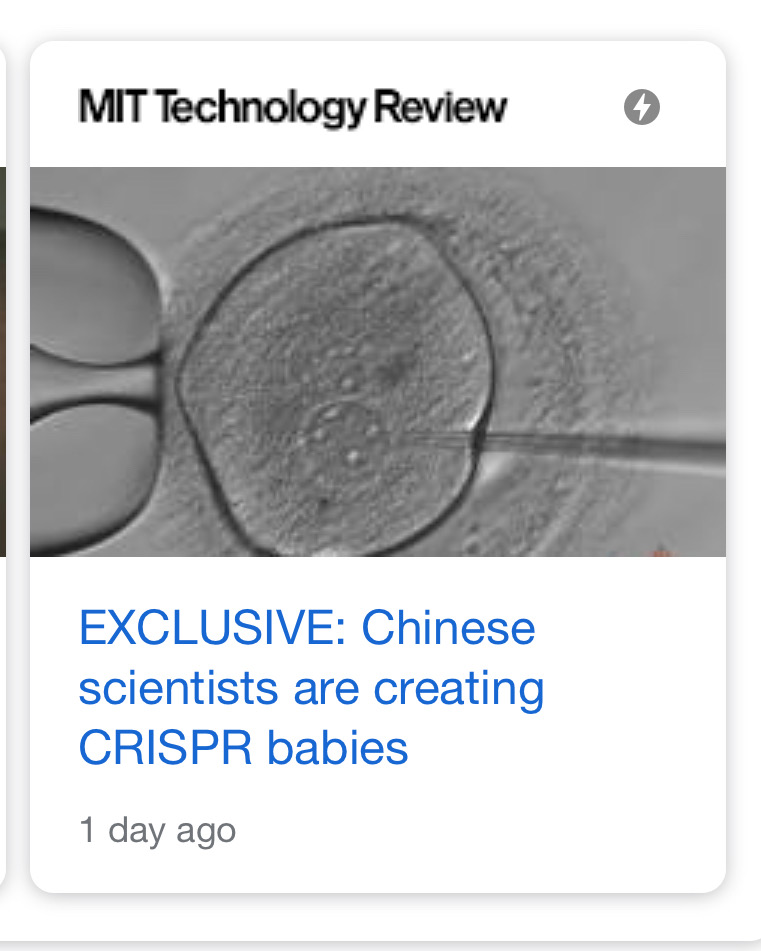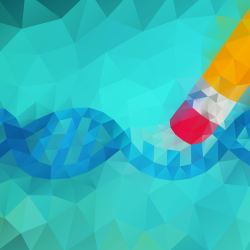You may have recently seen any of the following headlines saturating the airwaves over a scientist in China defying global ethical and procedural norms by going rogue and utilizing CRISPR technology in real world human experimentation:



Why is this a big deal?
Bioethicists and scientists worldwide are lambasting the work of researcher He Jiankui of Shenzhen as unethical, defying current standards and employing CRISPR-cas9 technology to alter reproductive DNA.
He claims that twin human babies were born as a result - the first ever in the world. But by choosing to report his secrete research on YouTube rather than through traditional channels like peer-reviewed journals and avoiding independent verification, nothing can be confirmed outside of his say-so. In the process he has created a firestorm with multiple regulatory agencies initiating investigations.
From a bioethics perspective, the scientist is in profound hot water. He betrayed thoughtful, collaborative science hindering future advancement by fostering distrust in the transparency of science and the actions of scientists. More importantly, the twins that he claims to have “genetically modified” may well be at extreme risk given the paucity of our knowledge and possible adverse impact such gene alteration can facilitate.
The potential for the technology lies in the possibility of preventing or treating serious disease. A big problem with using it too soon in human experiments like this is the edited gene(s) doesn’t get restricted to that person to fix a disease, but rather gets passed on to the generations to come. Additionally, by turning off one aspect we may enable another whose influence is unknown.
The current limited use of gene therapy, for example, in adults or kids only affects that individual and their severe, life-threatening disease – when all other avenues are exhausted. In the rare instances of its use in these situations, the risks of the side effects of the treatment, which can be significant, are compared to the likely fatal natural course of disease.
Even the co-founders of CRISPR are urging an immediate moratorium on human trials
Feng Zhang, one of the co-inventors of the CRISPR gene-editing process, has called for an immediate moratorium on the technique’s use in human babies underscoring the risks outweigh the benefits now. (1) To see a video interview of Dr. Jennifer Doudna, Professor of Chemistry and Molecular & Cell Biology at UC Berkeley and co-creator of CRISPR, and her response to this news, click here.
Scientist He justifies his actions because he employed the technique to create a baby with resistance to HIV infection. Pretty much the rest of the scientific community maintains since there are already ways to avoid HIV infection, treat it and prevent passage to the infant this choice by He is outside the very narrow window of severe, incurable disease that has been preliminarily discussed on the topic when contemplating guidelines. Since we don’t know what harm it can impose on the children and their offspring, governing bodies deem his effort an abuse of science and our current understanding.
Zhang’s formal statement printed in MIT Technology Review reads:
“Although I appreciate the global threat posed by HIV, at this stage, the risks of editing embryos to knock out CCR5 seem to outweigh the potential benefits, not to mention that knocking out of CCR5 will likely render a person much more susceptible for West Nile Virus. Just as important, there are already common and highly-effective methods to prevent transmission of HIV from a parent to an unborn child.
Given the current state of the technology, I’m in favor of a moratorium on implantation of edited embryos, which seems to be the intention of the CCR5 trial, until we have come up with a thoughtful set of safety requirements first.
Not only do I see this as risky, but I am also deeply concerned about the lack of transparency surrounding this trial. All medical advances, gene editing or otherwise and particularly those that impact vulnerable populations, should be cautiously and thoughtfully tested, discussed openly with patients, physicians, scientists, and other community members, and implemented in an equitable way.
In 2015, the international research community said it would be irresponsible to proceed with any germline editing without “broad societal consensus about the appropriateness of the proposed application.” (This was the consensus statement from the 2015 International Summit on Human Gene Editing).
It is my hope that the upcoming summit will serve as a forum for deeper conversations about the implications of this news and provide guidance on how we as a global society can best benefit from gene editing.”
Bottom line…
The reality is this scientist violated basic bioethical principles to society at large and given how much is unknown it is unclear if he could actually provide the individuals in the trial fully informed consent. He did not invent this technology, so being the first to utilize it in this manner reflects zeal more than intellectual achievement. The global scientific community has exercised restraint in this arena knowing the tremendous ramifications at play. How the scientific community and China deal with this rogue “scientist” will tell us more about how consensus statements about tight restrictions and oversight of CRISPR-Cas9 will be enforced – or whether we have decided that anyone can open up Pandora’s Box.
Note(s):
Feng Zhang and I both attended the Center for Excellence in Education's (CEE) Research Science Institute (RSI) - not at the same time. To learn more about the program (click here), see this piece "What Joe Lieberman And Ted Cruz Agree On: STEM" at this link here.

